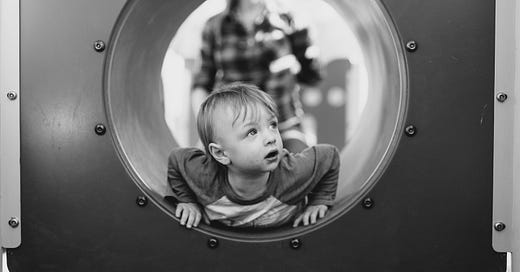We are told to standardise our children. We compare and contrast, from the off. We buy books of expectations which tell us when they are meant to first smile (6 weeks) and roll (4 months). And when they don’t do it on time, we fret. We worry about what that might mean, and what we could do about it – can you compel a baby to smile? What if they are just feeling serious?
We’re told about the standards everywhere, the developmental milestones. Do they have a pincer grip yet? Are they showing an interest in letters? Can they button their coat themselves? Childhood becomes a long list of things they should be doing now – and therefore things they aren’t doing yet.
Is that handwriting good enough, for a 9-year-old? Should an 11-year-old be able to pack their own lunch? We compare, and as we do so, we panic and we rush. For no one wants their child to ‘fall behind’. No one wants their child to be the one who can’t do what the others do, and so we worry, and then we push. We try to get them ready for each new stage, and so we make them doing things before they see the need.
What’s lost in all of this is how different children are. We don’t hear enough stories of varied developmental trajectories. Of children who learn to talk late, and then just can’t stop talking. Or those who have no interest in letters at all, until they are ten and see that reading an instruction manual might be useful. We don’t hear about the children who only eat noodles and nuggets for the first twelve years of their life, and then widen their pallet to include pretty well everything. The ones who don’t join in, until suddenly they want to do it all.
We don’t tell enough stories about how children change in unexpected ways. We’re encouraged to think that child development is a straight road or flight of steps, when really it’s a meandering path. We think there’s only one way to adulthood, when in fact there are many.
Our task as the grown ups is to hold their options open for them, to give them the space to change when they are ready. Our job is to make sure they are allowed to travel their path. Not to lock them down to how they are now, not to hem them in with evaluations like ‘not good enough’ or ‘behind’. Not to compare them to others their age and find that they are wanting.
Our task is to show them that many ways can be the right way, and that we’re right alongside them as they find their own.





Nice write-up! I had thought about the consequence of such "developmental milestones", more in the context of schools (and in German), though: https://danielkarrasch.substack.com/p/ich-wei-es-nicht
The thing is that with these milestones, we as a society manage to create very specific moments of (potential) shaming. The child doesn't smile at 6 weeks? It's behind! The child doesn't roll at 4 months? Something's wrong! The 11-year-old can't pack their own lunch? What a catastrophe! But, does anyone care if the 6-year-old doesn't smile? No. Does anyone test 40-year-olds whether they roll? No. As for schools, it's even worse: there are abilities that we don't even expect from those who are "too young" AND from those who are "too old": who remembers all details of the photosynthesis, or still knows how to differentiate and integrate functions?
Many have written about the way American children are currently infantilized, especially when compared to kids of just a few decades ago, when very young children crossed streets, rode public transit and stayed home alone, etc. (Just this summer two of the kids I worked with, aged 5 and 6, told me that turning their shirts rightside out was too difficult for them.) What I wonder is how this affects some of the milestones referred to by Dr. Fisher. If "crossing the street without help" is on the list, there would have to be two ages listed: the one that kids USED TO DO THIS AT, and the one our current, insane society has decided they should be before attempting this extraordinary feat (13? 14? 17?). How about walking to the store without a security detail? Prior to the 1990s: 5-7. (Any number of folks over, say, 50, can tell you they were sometimes tasked as a kid with the job of going to the store to buy cigarettes for their parents, lol. Today movies contain a warning about characters who smoke!). Today: around 13 or older (with a cellular leash, of course). My point is that almost all such milestones are more a product of culture than of child development, and our culture has gone completely off the deep end when it comes to kids' attempts to master their environment. On the one hand, too much pressure is put on them to start building their resume at age 5, and on the other they're kept helpless and disturbingly dependent on adults much longer than is healthy. It would be good if we switched these things around: let kids learn at their own pace, AND let them explore their world and take normal risks when Mother Nature intended they do it. Sadly, I don't expect this to happen any time soon.